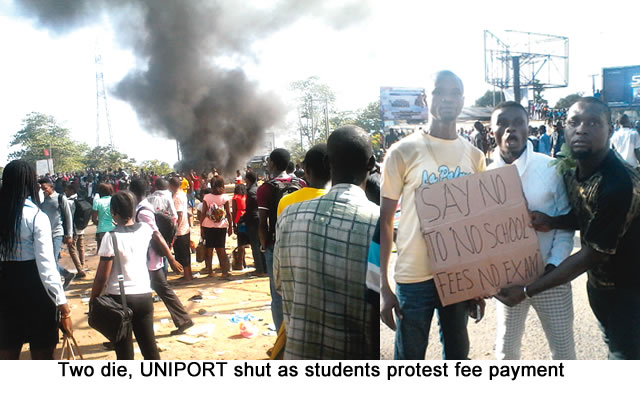Stakeholders on Tuesday in Abuja expressed mixed reactions to the crisis that erupted at the University of Port Harcourt (UNIPORT) over the no-tuition fee, no examination policy of the university.
The News Agency of Nigeria (NAN) recalls that students of UNIPORT on Monday staged a violent protest against the policy.
The protest, which turned violent, resulted in the shutting down of the institution following the destruction of property worth millions of naira and one student reported dead.
In his reaction, Malam Ibrahim Yakasai, the Director of Information, National Universities Commission (NUC), said media reports that the protest was against tuition fees were wrong.
He said the commission was waiting for the formal report of the UNIPORT’s vice-chancellor so as to ascertain what happened.
“First, let me correct an impression as was being reported that students protested because of tuition fees; federal universities are tuition-free; so it was not tuition fees.
“However, universities are allowed to charge some municipal fees and other charges that are not too much.
“We heard about the crisis and we are waiting for the vice-chancellor to give us a report upon which we act or comment.
“I am sure that the vice-chancellor is working on the report to explain to us what happened; after that, we will act as appropriate.”
Yakasai further said that all arms of Nigerian universities were allowed to come to the commission and complain, adding that no student or student leader from UNIPORT wrote to NUC to complain about anything.
He said that universities always operate within the allowable limit in terms of charging fees as NUC monitored them closely in that regard.
“When we get any report that any university has exceeded what is allowed, we call such school to order and make them reverse their decision.
“For now, we have not been formally briefed on what led to that demonstration.
“I am sure the V-C will be detailed enough and we will confirm from students and invite all parties and settle the matter,’’ he said.
On his part, Mr Ezekiel Nwankwo, the Public Relations Officer of the National Association of Nigerian Students (NANS), blamed the violence on communication gap between the students and UNIPORT authorities.
He said that frequent postponement of examination date and the eventual fixing of April 7 deadline for payment caused a rush that was misinterpreted by some students.
“There is a serious lack of communication between the students and the school authorities.
“We console the family of the slain student and call on the Inspector General of Police and the Rivers State Commissioner of Police to set up a committee to investigate what led to the death of the student.
“Where has rubber bullet gone in handling protests? Why use life bullets on protesting students,” he asked.
Nwankwo said that NANS would make its final stance known after consultations.
Some parents who spoke to NAN, also condemned the actions of the security agents and appealed to the students to always resort to dialogue.
Mr Olisanyem Ifeajika, a journalist, said that students must learn to adopt dialogue with relevant authorities as a means of resolving issues that affect them.
‘’There is no record that there was any dialogue between the students and the school authorities.
“Students at all times should learn to adopt dialogue on any issue and exhaust it before taking actions like protests. Protest should be the last resort.
Ifeajika, whose ward is in the university, said that he believed that some students who had not adequately prepared for the examinations used the protest as a window to cause problems.
According to him, the increase of the school fees to N45, 000 had taken effect since last year, so the students had ample time to protest before their examinations.
He, however, expressed sadness that a live was reportedly lost and called on the security agents to exercise caution in discharging their duties.
“I feel bad as a parent that a life was lost; that death was avoidable.
“Our law enforcement agencies sometimes take extreme measures when dealing with unarmed crowd; it is condemnable.
“In civilised societies things like rubber bullets or water would have been used to disperse such a crowd,’’ he said.
Also commenting on the crisis, Mr Adefemi Oladapo, another parent, said that the students would have engaged the authorities in a dialogue before protesting. He also wondered why they they did not protest at the beginning of the session.
Oladapo said that the school authorities should have also consulted the students union before increasing the fees in order to arrive at an agreement that would have been beneficial to both parties.
“The students would have dialogued with relevant stakeholders — the Ministry of Education, the National Assembly Committee on Education to intervene in reviewing their school fees downwards before their exams.
“Sometimes, when some students are not prepared for examination, they look for one thing or the other to try to avoid writing their exams.’’
Oladapo condemned the actions of the security agents who were meant to have dispersed the crowd peacefully but allegedly ended up shooting a student.
“The Police are not even supposed to enter the school with live ammunition. It was a mere protest and they should have gone with rubber bullets, tear gas or water to disperse the students.
“The Nigerian police is usually quick to use live ammunition on protesting crowd; the government must address this and ensure it does not happen again.”
Meanwhile, the Rivers Police Command has denied that there were casualties during the students’ protest.
The command’s Public Relations Officer, DSP Ahmad Muhammad, told NAN that there was no casualty on the part of the police or students during the violent protest. (NAN)
This page has been viewed 690 times


























